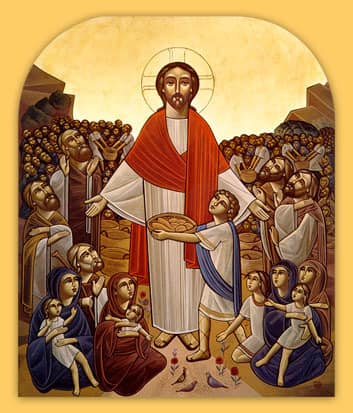 Gospel of 28 April 2020
Gospel of 28 April 2020
Tuesday of the Third Week of Easter
John 6:30-35
It is my Father who gives you the bread from heaven
The people said to Jesus, ‘What sign will you give to show us that we should believe in you? What work will you do? Our fathers had manna to eat in the desert; as scripture says: He gave them bread from heaven to eat.’
Jesus answered:
‘I tell you most solemnly,
it was not Moses who gave you bread from heaven,
it is my Father who gives you the bread from heaven,
the true bread;
for the bread of God
is that which comes down from heaven
and gives life to the world.’
‘Sir,’ they said ‘give us that bread always.’ Jesus answered:
‘I am the bread of life.
He who comes to me will never be hungry;
he who believes in me will never thirst.’
Reflexion
To the request of the crowds, “give us that bread always”, our Lord makes this audacious statement: “I am the bread of life. He who comes to me will never be hungry.” If you recall, similar words were used by the Samaritan woman who asked for the living water and our Lord replied in a similar manner as He did in today’s passage with one of His signature “I am” statements.
When Jesus called himself the bread of life, his listeners no doubt thought of Moses, whom God had sent down manna, bread from heaven that fed the Israelites for 40 years in the desert. They suspected that He was claiming to be even greater than Moses and that is why they challenged Him to do something greater than what Moses did. The multiplication of loaves and fish wasn’t enough. To them this was just a one-off miracle. Was there more to come? Like forty years or more of free jumbo meals? If Jesus is greater than Moses, they reasoned, shouldn’t He be doing something more spectacular or more lasting?
But immediately our Lord clarified that it was not Moses who provided the bread but God who is Jesus’ Father who gives the true bread from heaven. Moses was not the source of the manna; it was the Lord. And because God is the source, He now provides the “true bread from heaven.” The modifier “true” should not be taken to imply that the manna was false, but rather that it was incomplete or less than perfect. The manna in the desert was a genuine gift from God, but it only foreshadows the greater gift, Jesus who is the true bread from heaven.
Although this revelation may seem radically new to His listeners, it is not at all that novel. God prepared us for the mystery of the Eucharist in several ways. As manna was placed in the ark of the covenant, Jesus, the true bread of heaven, was conceived in the womb of the Blessed Virgin Mary, the new Ark of the Covenant. Our Lord was born in Bethlehem, a town whose name means “House of Bread.” His mother laid him in a manger, a feeding trough, a hint that someday he would be bread for the world. All four gospels narrate the account of the multiplication of loaves. Even the time Jesus instituted the Eucharist was a clue to its meaning—the time of Passover, where the sacrificial lamb and unleavened bread were eaten.
And so our prayer should echo the request of the crowds, “give us (this) bread always.” But unlike them, we have the advantage of knowing what we are asking for. Not ordinary food, not perishable food, but the true bread of God that has come down from heaven. Once consumed, this bread will make us not hunger for anything else.
